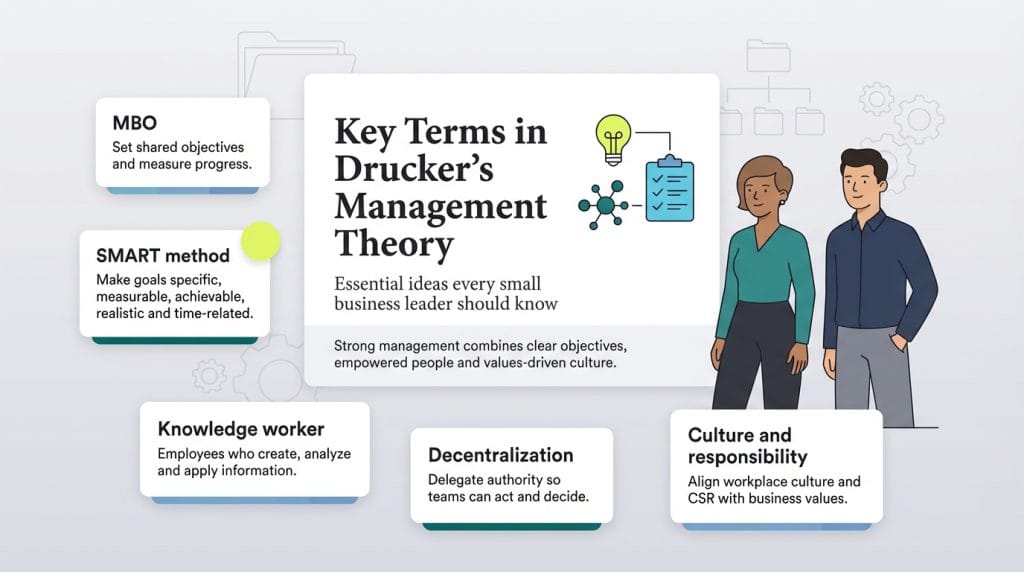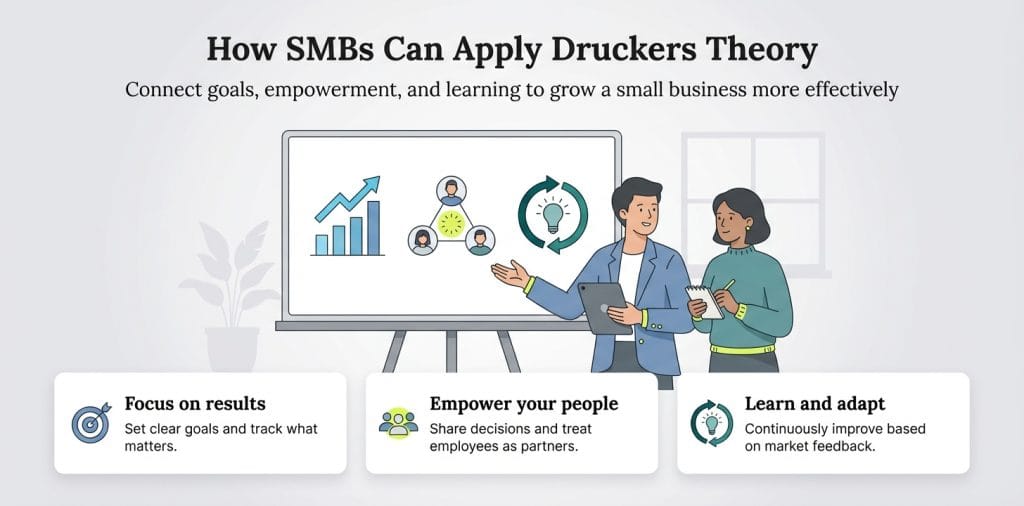Business.com aims to help business owners make informed decisions to support and grow their companies. We research and recommend products and services suitable for various business types, investing thousands of hours each year in this process.
As a business, we need to generate revenue to sustain our content. We have financial relationships with some companies we cover, earning commissions when readers purchase from our partners or share information about their needs. These relationships do not dictate our advice and recommendations. Our editorial team independently evaluates and recommends products and services based on their research and expertise. Learn more about our process and partners here.
P.F. Drucker (Peter Drucker): Modern Management Theory & MBO
Discover how Peter Drucker’s management theory can benefit your business.

Table of Contents
Peter Drucker — often known simply as “P.F. Drucker” — pioneered modern management with his innovative management theory centered on decentralized leadership, management by objectives (MBO) and the rise of the knowledge worker. His ideas remain foundational to contemporary thinking on management of theory and practice.
Business owners and managers who take the time to learn about Drucker’s lessons, life and work can glean many management principles that are just as relevant today as when he developed them decades ago. This guide will introduce you to key aspects of Drucker’s management theory, explain its modern relevance and compare Drucker’s philosophies to those of other management thinkers.
Who Is P.F. Drucker? (Peter Drucker profile)
Peter Ferdinand Drucker was born into an intellectually stimulating household in Vienna, Austria, on November 19, 1909. His parents regularly hosted evening gatherings with prominent economists, politicians, writers and scientists, including influential economist Joseph Schumpeter. This exposure to diverse intellectual conversations shaped his worldview from an early age.
Drucker’s remarkable career spanned over six decades, during which he transformed from a young journalist fleeing Nazi persecution to becoming the most influential management thinker of the 20th century. Often called “the father of modern management,” he authored 39 books and countless articles that fundamentally changed how organizations operate and leaders think about their roles. His insights extended far beyond traditional business management to encompass nonprofit organizations, government agencies and society at large, establishing him as both a practical consultant to major corporations and a visionary social philosopher.
Here are key highlights of Drucker’s life:
- 1920s: Left Austria for Germany to study law at Hamburg University, later transferring to Frankfurt University while working as a senior newspaper editor
- 1932: Earned his PhD in international law from Frankfurt University
- 1935: Relocated to England after Nazi authorities banned his writings
- 1937: Immigrated to the United States with his wife Doris Schmitz, beginning his American teaching career at Sarah Lawrence College
- 1940s: Conducted his influential study of General Motors, which became the foundation for his book, Concept of the Corporation
- 1950-1971: Served as professor of management at New York University while establishing his consulting practice
- 1954: Published The Practice of Management, considered the foundational text for modern management studies
- 1971-2002: Held the Marie Rankin Clarke Professorship at Claremont Graduate University
Drucker received the Presidential Medal of Freedom in 2002, with President Bush recognizing him as a pioneer of management theory. He passed away on November 11, 2005, at age 95.
The management theory of Peter Drucker

Drucker’s management theory centers on the idea that management is a distinct professional discipline focused on making people productive through systematic practices, clear objectives and results-oriented decision-making rather than intuition or tradition. He emphasized that effective management requires treating employees as valuable resources whose contributions should be maximized through proper organization, delegation and a focus on outcomes that serve both the organization’s mission and society’s broader needs.
“Drucker felt that all businesses need and deserve to be managed well,” said Drucker disciple Bruce Rosenstein, author of Create Your Future the Peter Drucker Way and Living in More Than One World: How Peter Drucker’s Wisdom Can Inspire and Transform Your Life. “Part of that, he believed, was thinking about the future… He recognized that even if you’re really successful now, you will fail later if you’re not thinking about the future.”
Drucker argued that managers should be concerned primarily with achieving outcomes and creating value for customers and stakeholders. That entails setting clear objectives, measuring performance against those objectives, and continuously improving processes to enhance productivity and efficiency. Drucker also believed organizations should be proactive in anticipating and responding to changes in the external environment. Managers must constantly scan the business landscape, gather information and adjust strategies accordingly. Learning and innovation should be ingrained in a company’s culture.
Drucker emphasized that management centers on people and their empowerment. “Management is doing things right; leadership is doing the right things,” he famously stated. His philosophy promoted active employee involvement in decision-making processes, creating innovation opportunities while building responsibility and accountability throughout teams.
Core concepts in Drucker’s management theory

The core concepts of Drucker’s management theory center around decentralized leadership, management by objectives, the knowledge worker and management as a liberal art.
Decentralized leadership
Drucker advocated for distributing workplace management authority rather than concentrating it at the top. He believed businesses should empower their staff so employees feel valued and understand their contributions matter. His approach involved delegating meaningful tasks, giving frontline workers responsibility and accountability, and aligning supervisors with their teams toward common organizational objectives.
Small businesses often have flatter organizational structures, which makes it easier to decentralize leadership and distribute decision-making authority. By involving employees in decision-making and encouraging their input, owners and managers can empower and engage their employees.
Drew Yancey, founder of Teleios Strategy, emphasized the value of this approach and recommended viewing employees as “partners in creating value” rather than merely resources to manage.
“When leaders shift their mindset from controlling to enabling, they unlock tremendous potential,” Yancey said. “This plays out in practical ways — from involving team members in strategic decisions to creating autonomous work teams that can respond quickly to customer needs.”
Management by objectives (MBO)
In developing the concept of management by objectives, Drucker proposed that managers and employees should collaboratively set goals that align individual objectives with overall organizational ones. Regular feedback and performance evaluations should be conducted to track progress and provide guidance.
For organizations and individuals, Drucker believed in fellow management consultant George T. Doran’s concept of SMART goals — goals that are specific, measurable, achievable, realistic and time-bound. The SMART method is a means of making sure an objective is valid.
Businesses can use MBO to involve employees in goal-setting and performance measurement. This approach ensures that individual efforts contribute directly to organizational success while providing employees clear direction and purpose.
Knowledge worker
Knowledge workers, such as engineers and analysts, are white-collar employees whose jobs require handling or using information. Drucker — who foresaw the knowledge-based economy years before the rise of computing and the internet — placed a high value on workers who solved problems and thought creatively, Rosenstein said. He wanted to foster a culture of employees who could provide insights and ideas as well as labor.
Drucker introduced the term “knowledge work” in 1959, anticipating an economic shift in which intellectual capabilities would become more valuable than physical labor. This concept recognized that future business success would increasingly depend on employees’ ability to analyze, synthesize and apply information creatively.
Management as a liberal art
Drucker felt strongly that managers should improve and develop themselves and their team members, Rosenstein said. Investing in employee training is intrinsic to Drucker’s philosophy. He believed, for example, that external development — via participation in industry trade groups and conferences — is especially valuable.
Drucker positioned management as more than technical expertise, viewing it as a discipline requiring broad knowledge across psychology, sociology, ethics and philosophy. This comprehensive approach emphasized that effective managers need diverse educational backgrounds to understand complex human relationships and societal impacts within business contexts.
Drucker considered establishing management as an academic discipline focused on people, power, values and responsibilities among his most significant contributions to the field.
How Drucker’s theory compares to other management thinkers

Drucker’s management philosophy contrasted sharply with earlier theorists, including Fredrick Taylor, Henri Fayol and Henry Mintzberg. The chart below outlines the differences in the men’s management theories.
Aspect | Peter Drucker | Frederick Taylor (Scientific Management) | Henri Fayol (Administrative Theory) | Henry Mintzberg |
|---|---|---|---|---|
Focus | People-centered, holistic | Task efficiency, standardization | Organizational structure, hierarchy | Practical experience over theory |
Decision-Making | Decentralized, employee empowerment | Top-down, management control | Centralized authority | Situational, adaptive |
Worker View | Knowledge workers, creative contributors | Interchangeable parts, efficiency units | Resources to be organized | Complex roles requiring experience |
Innovation | Continuous adaptation, future-focused | Process optimization | Administrative efficiency | Learning through experience |
While Taylor focused on optimizing individual tasks and Fayol emphasized rigid organizational hierarchies, Drucker revolutionized management by prioritizing human elements and forward-thinking strategies. His approach rejected mechanistic models, instead acknowledging that organizational tensions and differing viewpoints could be productively integrated into effective management practices.
Mintzberg’s emphasis on experiential learning shares some similarities with Drucker’s practical orientation. However, Drucker distinguished himself by creating management as a formal academic field while maintaining its people-centered, practical foundation. Drucker also pioneered corporate social responsibility concepts and viewed businesses as integral parts of larger social systems — ideas largely absent from earlier management theories.
Business owners and company leaders should carefully consider which of these approaches might fit best with their organization.
“[Adjusting one’s leadership style to the situation] requires managers to be knowledgeable about different management theories and styles so they [can best choose] one to employ, depending on the context and people in play,” said Shwetank Dixit, the founder of Voohy, a platform for leadership and career skills training.
Modern relevance and critiques of Drucker’s management theory
Though Drucker developed his management theory decades ago, his legacy not only endures but remains relevant today. At the same time, there are valid critiques of Drucker’s philosophies.
Contemporary relevance
Drucker’s management principles apply to modern businesses, particularly small and midsize enterprises. Several key aspects demonstrate enduring relevance:
Results-oriented approach: Drucker’s focus on achieving results is eternally relevant because small and medium-sized businesses often operate in resource-constrained environments and need to optimize performance. These organizations can benefit from Drucker’s insistence on setting clear objectives and regularly tracking progress toward those goals.
“[Drucker’s theory requires] a sense of where you’re going, what good results look like and how you’re going to achieve them,” Rosenstein said. “You have to think in a very concrete way about what you want to accomplish so that you can get there, and help other people get there.”
Continuous learning and adaptation: Small and midsize businesses operate in dynamic and competitive markets. Drucker’s emphasis on continuous learning and adaptation is as crucial to their success today as it was in the 1950s. Companies must foster a culture of learning that encourages employees to develop new skills, explore innovative approaches and adapt to changes in the market.
“Drucker wrote about ‘the future that has already happened,'” Rosenstein said. “Think about self-driving cars or blockchain or artificial intelligence. These are things that have already happened but whose full social impact hasn’t yet been realized. Drucker would have argued that your business needs to be thinking now about what those things are going to mean for your business down the road.… His advice is timeless. It will still apply years from now — whatever the current trends and technologies are.”
Corporate social responsibility (CSR): Rosenstein said Drucker was a holistic thinker. Instead of looking at businesses as discrete entities, he saw them as components of a larger social system. In that context, he argued that companies should see themselves as part of a community and make decisions in that regard — with equal respect for their external and internal impact. This dovetails with modern arguments in favor of corporate social responsibility.
Companies that embrace corporate social responsibility often experience enhanced brand reputation, improved employee retention and stronger financial performance, demonstrating that Drucker’s vision of businesses as community partners has become a competitive necessity. Modern examples like Patagonia’s environmental activism and Microsoft’s carbon-negative commitment show how CSR initiatives can drive both social impact and business growth, proving that Drucker’s approach remains highly relevant in today’s interconnected global economy.
Valid critiques of Drucker’s theory
While Drucker’s theories have proven remarkably durable, some critiques remain relevant:
Decentralization challenges: Some management scholars note that excessive decentralization can lead to fragmented decision-making and inconsistent organizational direction, particularly in large, complex organizations where coordination becomes critical for operational effectiveness.
Implementation complexity: Critics observe that while Drucker’s people-centered philosophy sounds appealing, it can be challenging to execute consistently across diverse organizational contexts where standardized processes and clear hierarchies may be necessary for maintaining quality and efficiency.
Cultural adaptation: Scholars point out that Drucker’s theories emerged primarily from Western business environments and may require significant modification when applied to organizations operating in different cultural contexts with varying expectations about authority, collaboration and decision-making processes.
FAQs: P.F. Drucker and his management principles
- Contingency Management Theory (Fred Fiedler): Emphasizes that there is no one-size-fits-all approach to managing a business — different internal and external factors call for varying solutions. This theory highlights the importance of adaptability, self-awareness and objectivity. Learn more: The Management Theory of Contingency
- Covey Management Theory (Stephen Covey): Advocates for becoming better leaders by changing from within. Covey's book, The 7 Habits of Highly Effective People, suggests leaders must implement specific practices: being proactive, envisioning the future, prioritizing, considering others' needs, actively listening, encouraging creative cooperation and practicing self-care. Learn more: The Management Theory of Stephen Covey
- Follett Management Theory (Mary Parker Follett): Emphasizes "powering with" instead of "powering over" employees. This theory uses four coordination principles: direct communication between managers and employees, mastering coordination early, fostering reciprocal responsibilities among employees and maintaining continuous coordination. Learn more: The Management Theory of Mary Parker Follett
- Juran Management Theory (Joseph Juran): Uses a structured approach called the Juran Trilogy to improve organizations and achieve quality from the top down. The approach consists of three key stages: quality planning, quality control and quality improvement. Learn more: The Management Theory of Joseph Juran
- Kanter Management Theory (Rosabeth Moss Kanter): Focuses on making positive organizational improvements through business operations and leadership. The Harvard professor's theory emphasizes six steps for organizations to promote positive change: showing up, speaking up, looking up, teaming up, never giving up and lifting up. Learn more: The Management Theory of Rosabeth Moss Kanter
- Mayo Management Theory (George Elton Mayo): As the founder of the human relations movement, Mayo's theory emphasizes that employees are more motivated by relational factors like teamwork and recognition than by monetary benefits or environmental conditions. Learn more: The Management Theory of Elton Mayo
- Schein Management Theory (Edgar Schein): Highlights how business culture impacts organizational change. By understanding three levels of culture — artifacts, espoused values and basic assumptions — leaders can improve their organizational culture to promote positive change. Learn more: The Management Theory of Edgar Schein
- Weber Management Theory (Max Weber): Known as the bureaucratic theory, it emphasizes adhering to strict rules and regulations. This theory advocates taking a bureaucratic approach to management, ensuring equal treatment and work distribution based on skill sets and qualifications rather than personal connections. Learn more: The Management Theory of Max Weber
Skye Schooley contributed to this article. Source interviews were conducted for a previous version of this article.















